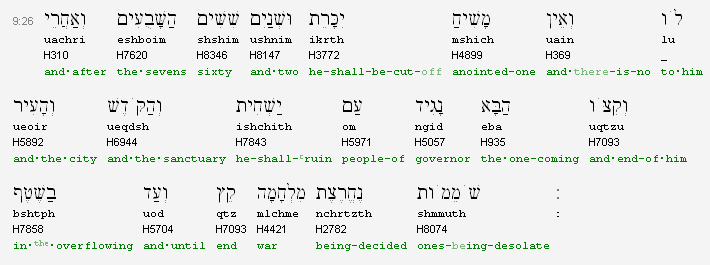|
|
|
How can the ‘HE’ of Dan. 9:27 be a Roman TYPE ‘coming prince’? According to the KJV, et. al, in the following Passage of Dan. 9:26 we find that the ‘People’ (Roman) of the ‘coming prince’ (Roman) are the ones who actually destroy the city and the sanctuary. (emphasis added)
Daniel 9:26 With regards to the above Passage the subject noun is ‘People’ (the ones destroying) and the parsed Hebrew word ישׁחית 7843 (ishchith - shachath) ‘He shall destroy’ is used as a Hebrew hiphil, verb, imperfect, 3rd person, masculine, singular and, is completely acceptable in Hebrew with the use of the singular subject noun ‘People’, whereas the translated word ‘People’ in the above Passage is implied to be acting as a single unit – therefore a singular noun and, NOT a plural noun, receiving a 3ms verb. In addition, the Hebrew word ‘shachath’ MUST also be translated as ‘He shall destroy’ and NOT just simply as ‘shall destroy’ unless the ‘HE’ is either implied or articulated – written or verbally spoken BECAUSE, the Hebrew word ‘shachath’ is used in this Passage as a Hebrew hiphil, verb, imperfect, 3rd person, masculine, singular.
Dan. 9:26
Daniel 8:24 Therefore, if the subject noun in the above KJV, et. al., Passage is the singular ‘People’ (and it indeed is) and it receives the corresponding 3rd ms verb ‘He shall destroy’ then by legitimate Hebrew and English grammatical standards who MUST the ‘HE’ of Dan. 9:27 be (and He shall confirm...)? Does consistent contiguous grammatical standards dictate that the ‘HE’ of Dan. 9:27 be the SAME preceding antecedent singular subject noun ‘People’ (the ones destroying) or can we just simply arbitrarily choose to substitute a different subject noun in the place of ‘people’ – in this case the ‘a coming prince’ (a Roman TYPE coming prince)? It must be noted that the translated word ‘People’ (Roman) which as stated above is correctly used as a singular BUT is by NO means however an equivocal singular ‘Person’ (a Roman TYPE Person – a coming prince). For example, because the use of the transliterated Hebrew singular word ‘People’ is somewhat grammatically awkward with respect to its English translation, even though it is correct, let us for the sake of clarity hypothetically substitute the word ‘General’ (subject noun) in the Dan. 9:26 Passage, in replacement of the word ‘People’ (subject noun).
Daniel
9:26 (hypothetical)
Daniel 9:27 Once again, if we apply legitimate consistent Hebrew and English grammatical standards to the above ‘hypothetical’ Passages who MUST the ‘HE’ of Dan. 9:27 actually be – the General or the coming prince? Moreover, as stated before, the translated word ‘People’ (the Roman HE) in Dan. 9:26 is correctly used as a singular subject noun BUT, it is by NO means however a singular subject noun ‘Person’ (Roman TYPE Person) even though we may ALSO assume as some suggest an alleged GAP in time (approx. 2,000 years) between Dan. 9:26-27. It does NOT matter The HE of Dan. 9:27 is grammatically ‘ACHORED’ and identified in the preceding antecedent Passage of Dan. 9: 26 NO matter whether or not there is the existence of an alleged time GAP. Once again, any attempt then to ‘substitute’ an alternate and arbitrary subject noun (a coming prince) for the HE of Dan. 9:27, even if we assume a theoretical GAP, other than the clearly grammatically defined antecedent ‘People’, the HE of Dan. 9:26, is to simply IGNORE ALL Hebrew and English grammatical rules merely to fit a theory. If we are going to go down that slippery slope where we ignore grammatical rules and standards simply to fit our theories then there is LITTLE hope of ever arriving at the TRUTH of Scripture. |
|
|
